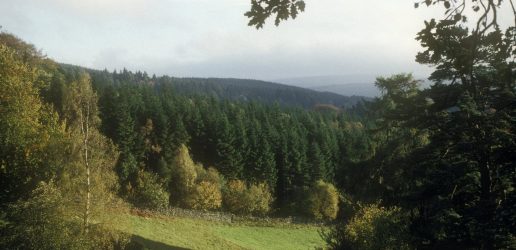
Actions to address significant gaps in forestry policy, research and practice are necessary to deal with the unprecedented pace and scale of environmental change, say forestry organisations launching a new action plan at APF the UK’s largest forestry show.
Climate change is threatening the health of trees and woods and requires a co-ordinated response to help them adapt and become resilient to its current and projected impacts. The Forestry Climate Change Working Group (FCCWG) – public and private organisations representing the 35 signatories to the 2015 Forestry Climate Change Accord– have identified 13 priority actions and pledged to work together on them over the next five years.
The “Action plan for climate change adaptation of forests, woods and trees in England” address major gaps in current forestry policy, research and practice. The 13 priority actions are the result of a rigorous process of consultation carried out over the last three years, and are consistent with Defra’s Tree Health Resilience Strategy published earlier this year.
The plan also recognises that, in the face of climate change, many traditional forest and woodland management practices need to be revised. Some of the gaps identified include: lack of woodland management by owners; insufficient diversity of planting stock from nurseries; limited uptake of silvicultural practices which limit risk; and, the need for better education and information.
Launching the plan at the APF Exhibition on behalf of the FCCWG, Sir Harry Studholme, Chair of Forestry Commission England said: “Our forests, woodlands and trees are already facing unprecedented challenges from environmental change and the changes will continue. The impacts of this will alter the ecology, the appearance and the management needs of these woods and forests. We have to adapt because if we do not the costs will be paid by all of us for generations to come.
“That is why I welcome the launch of this plan to drive forward a truly collaborative response by the forestry sector.
“It is a remarkable achievement that such a wide range of organisations have been able to agree actions that should ensure our legacy will be of woodlands resilient to the changes they face.”
Simon Lloyd, Chief Executive of the Royal Forestry Society and chair of the FCCWG added: “The future of our forests and trees is too important to leave to chance. By coming together as a sector, with clear timelines and accountability, we can ensure that climate change adaptation has the profile and priority required to drive change that will make a material difference to the resilience of forests and trees.
Forest Research has played an active role in the development of the Action Plan, including summarising scientific information about the risks and opportunities that our changing climate poses to forestry, and hosting in October 2017, a workshop with senior forestry sector leaders, to identify priority climate change adaptation actions for the sector over the next five years.
New research has been published which explores how to enable and encourage access to woodlands for diverse members of the public.
Forest Research has been involved in a project focusing on efforts to improve inclusivity in biosecurity practices by exploring how to integrate different knowledge systems into mainstream decision-making.

Forest Research has released the latest Accredited Official Statistics on woodland and forestry in the UK.
New research has been published which explores how to enable and encourage access to woodlands for diverse members of the public.
Forest Research has been involved in a project focusing on efforts to improve inclusivity in biosecurity practices by exploring how to integrate different knowledge systems into mainstream decision-making.

Forest Research has released the latest Accredited Official Statistics on woodland and forestry in the UK.